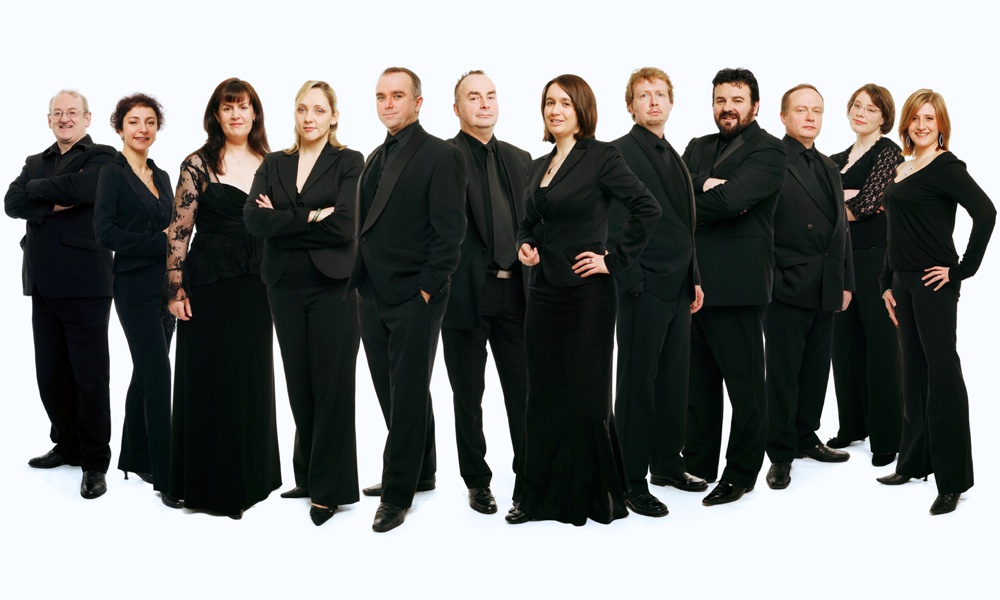Cath Barton was at the Vale of Glamorgan Festival to review performances by the Juice Vocal Ensemble and Chamber Choir Ireland.

photo by Dannie Price
I vividly remember the concert given by Juice Vocal Ensemble in the 2010 Vale of Glamorgan Festival, when they gave the first performance of their project Laid Bare: 10 Love Songs, an exciting mix of works commissioned from composers working in widely diverse styles. I was pleased to have a chance to hear one of these again in this year’s festival. Damien Herron’s When Birds Do Sing, enlivened by the use of twanging Vietnamese lammelophones, was a sweet opener to the afternoon concert given by Juice Vocal Ensemble. Use of a well-known text (Shakespeare’s ‘It was a lover and his lass’) means that as a listener you can fully enjoy the vocal sounds employed by the composer, rather than having to focus with part of your brain on what the words mean. Here were birds beat-boxing on a spring day, in a gentle, amusing way. Anna Snow, Sarah Dacey and Kerry Andrew, who together make up Juice, are consummate musicians, and together they can tease out the most subtle and intricate of colours, harmonies and rhythms in the songs they sing. Their command of extended vocal techniques is superb and I love hearing them sing together. My major disappointment about this concert was that they did not do enough of that. I was somewhat bemused that two of the most substantial works in their programme were for solo voices. I understand that the Festival organisers will have wanted to take every opportunity to showcase the work of John Tavener, one of the featured composers this year, hence the inclusion of his Akhmatova Songs, but the choice of Andrew Wilson-Dickson’s Three Songs of Spam is more mysterious.
Furthermore, to include this in a programme entitled ‘Literary Connections’ is downright perverse! Well-constructed and pleasant to the ear as the musical content of the piece is, the setting of the nonsense received by the composer in e-mail spam left me wondering why. I think that vocal music, if it is to be satisfying, has to have some meaning for the listener that relates to the texts which are set. The Vale of Glamorgan Festival commission for Juice from Gabriel Jackson, Zero Point Reflection, sets words by the Estonian poet Doris Kareva carefully and rather literally, an approach which is particularly effective with the final words ‘The falling stars rain ever more steadily.’ In contrast, South African born, Cardiff-based Robert Fokkens’ Words plays with sounds of individual words and their components. The composer says that he does this ‘without concern for meaning’ but, actually, I found that the way he set, for example, the word ‘sheepdip’ did convey a lot about sheep and the noises they make! Having said that, vocal music does not have to set text at all, and Ferrara Redux, the piece which Juice commissioned from Toby Twining for their US trip in November 2013, is one such. It takes its title and inspiration from the virtuosity of the female singers at the Court of Ferrara in northern Italy in the sixteenth century. Following on from Laurence Roman’s suitably comic setting of Hilaire Belloc’s cautionary tale of the unfortunate child George, Twining’s piece demonstrated the three singers’ skills in handling subtle shifts in tonality and tuning. The audience called for an encore, and were rewarded with an example of just how versatile this ensemble is: the laid-back close harmony of the bluegrass tune ‘Roll in My Sweet Baby’s Arms’.
*

Tarik O’Regan, sharing ‘featured composer’ status with the aforementioned John Tavener at this year’s Vale of Glamorgan Festival, featured in Juice’s concert so briefly that I had no real sense of his music until I attended Chamber Choir Ireland’s performance of his Accallam na Senórach: an Irish Colloquy. I approached this with some trepidation, seeing as it is an hour-long setting of Irish tales with which I was completely unfamiliar. I need not have worried. Not only were the programme notes full and clear, and the pre-concert conversation between the composer and Wales Arts Review’s Steph Power very helpful in setting the scene for this ‘secular/sacred handshake’, but there were also surtitles, for which a big thumbs-up. Further, the musical setting was so clear, so straightforward, without ever being trite, that the story came across wonderfully well. In conversation with Steph Power before the Festival, conductor of Chamber Choir Ireland Paul Hillier spoke of the importance of narrative in enabling audiences to connect with new choral works, which was why he commissioned Tarik O’Regan to write such a piece for Chamber Choir Ireland. The libretto which O’Regan used was drawn directly from a mediaeval narrative text, the literal translation of which is ‘dialogue of the elders’. The original text contained up to one hundred stories, from which Tarik O’Regan has sensibly selected just a few to tell in song. The framework for these is the arrival in Ireland of St Patrick. He baptises the ancient warriors who he meets. They in turn recite poems to him. It is an even-handed exchange, something which the composer said was particularly attractive to him, as was the ‘handshake’ between poetry and prose. He has set the prose – the narrative – in English and the poems in the original language of Middle Irish. The result is a piece which is enthralling to listen to throughout. It draws the audience in from the very first quiet notes on the guitar and a kind of calling from the bodhráin (Irish frame drums) played by two members of the choir. It is as if the past is stirring. Tarik O’Regan has his own voice, but one which is firmly rooted in the musical traditions from which he comes. He employs no artifice, and his music is accessible to singers and audiences alike. Refreshingly, this is a piece which demands fine singing, certainly, but does not make technical demands which place it beyond the reach of good amateur choirs. The music, particularly in the guitar interludes, makes reference to the music of North Africa, with which there is a strong connection in Irish folk tradition. Tarik O’Regan said that he had chosen the guitar rather than, say, the harp because it could be held, to give the whole piece the possibility of mobility. Given that, and its connection with storytelling tradition, it would have been lovely to have heard it in a less formal setting than the Dora Stoutzker Hall. I imagine it being sung and played in an old baronial hall, with the choir moving around and sometimes spatial separation between the parts.
*
The programme for Chamber Choir Ireland’s lunchtime concert appeared on paper to be a curious mixture of pieces. In practice it was a completely satisfying musical journey from the declamatory cries of David Lang’s when we were children, receiving its UK première, to the much-loved swell of John Tavener’s Song for Athene, which concluded the concert. Like Tarik O’Regan’s piece the previous day, the programme offered secular songs alongside this sacred music, and all credit to Paul Hillier for the skilful way in which he had put it together. John Tavener’s The Lamb is much-performed by choirs at Christmas, but can disappoint because the deceptively simple setting shows up any discrepancies in tuning. No such problem from Chamber Choir Ireland, whose tuning is impeccable and sound pure. They showed their rhythmic skills in Steve Martland’s Sea Songs – the punchy Fire down Below and before that Dance to your Daddy. A folk song from Northumberland, this is described as a dandling song, as in dancing a baby on your knee. There is something sweetly sad about it, and the line ‘love them all you can’ jumped out at me, even though I can not find it in published versions of the text. Perhaps the poignancy of this, and of Jenny Jones from Steve Martland’s Street Songs – in which I could hear a keening sound echoing the sounds of The Lamb – was the more so because of the composer’s sudden death at only 53 last year. Malcolm Williamson’s The Musicians of Bremen was an utter delight, a musical palate-cleanser in which six of the men of the choir showed just how expressively they could sing and act the little band of animals, who just want to be friends with the scoundrels they encounter on their journey. In stark contrast, Irish composer David Fennessy’s Letter to Michael, written for Chamber Choir Ireland, was searing, setting as it does words written by a woman from a psychiatric hospital to her husband. Paul Hillier passed round a copy of one of the letters, layer on layer of the same desperate words. The plosive ‘k’ of the word ‘komm’ (‘come’), repeated over and over, was heart-rending. Behind the altar in All Saints Church hangs a banner proclaiming ‘Alleluia’ in bold colours. How appropriate then, that it is that word which brings John Tavener’s Song for Athene to its glorious climax, and with which Chamber Choir Ireland sent their capacity audience out into the May sunshine rejoicing.
*
The range of vocal and choral music in these three concerts was remarkable. Tarik O’Regan’s music, in particular, was a revelation to me, and he has written much choral music of which I hope to hear more. I do, however, note with disappointment that I heard nothing from a woman composer. Furthermore, the Vale of Glamorgan Festival 2014 included work from forty-two composers, of whom only two were women.
Juice Vocal Ensemble: Fonmon Castle, 11 May 2014 ‘Literary Connections’, including new works by Tarik O’Regan and Gabriel Jackson Hannah Morgan, clarinet, Alice Neary, cello
Chamber Choir Ireland: Dora Stoutzker Hall, Royal Welsh College of Music and Drama, Cardiff, 15 May 2014 Tarik O’Regan: Accallam na Senórach: an Irish Colloquy Paul Hillier, conductor Stewart French, guitar
Chamber Choir Ireland: All Saints Church, Penarth, 16 May 2014 Including UK premières of works by David Lang and David Fennessy Paul Hillier, conductor



 Enjoyed this article? Support our writers directly by buying them a coffee and clicking this link.
Enjoyed this article? Support our writers directly by buying them a coffee and clicking this link.







